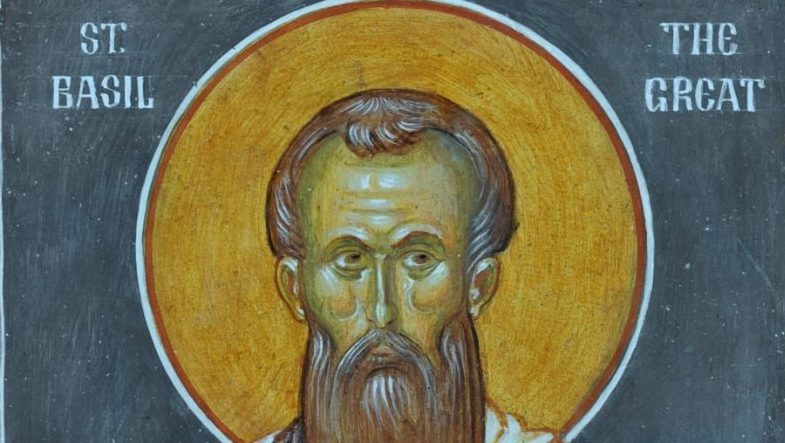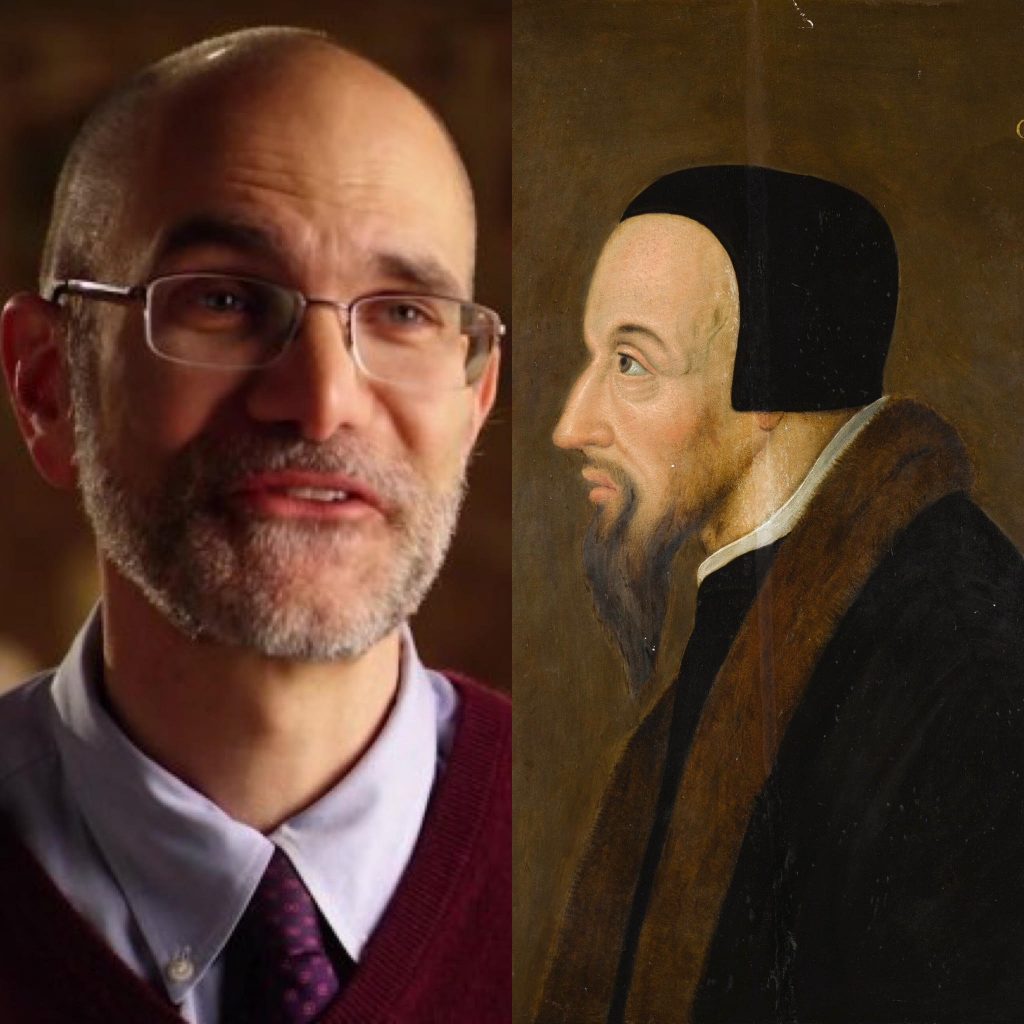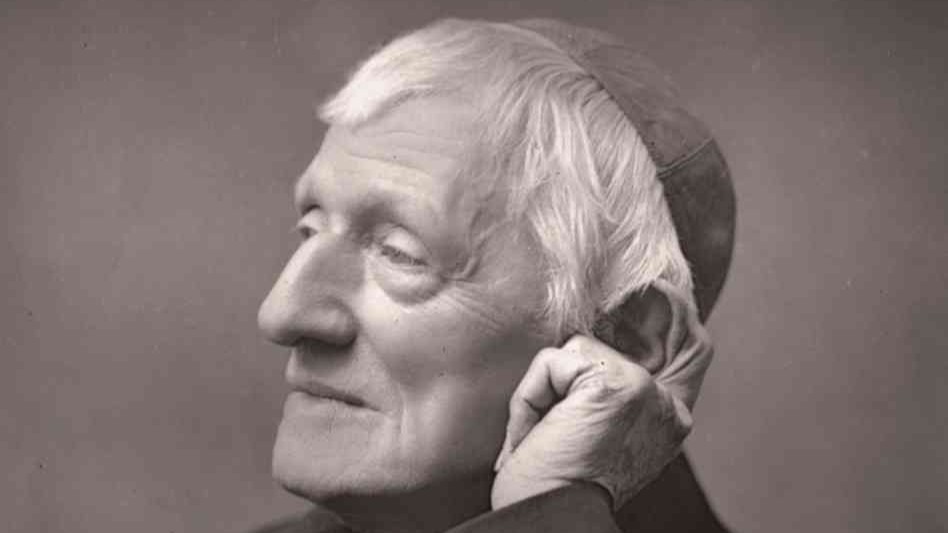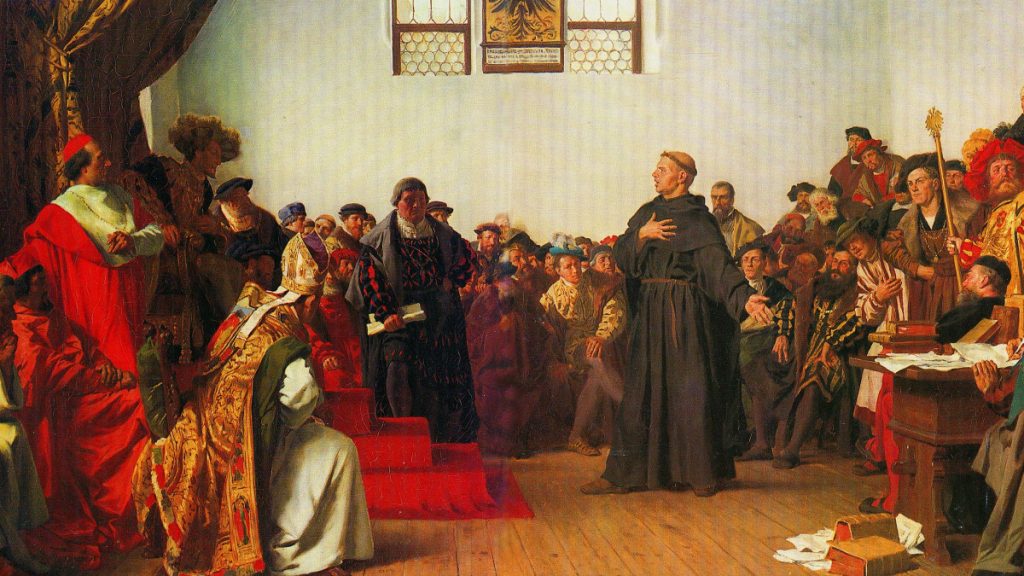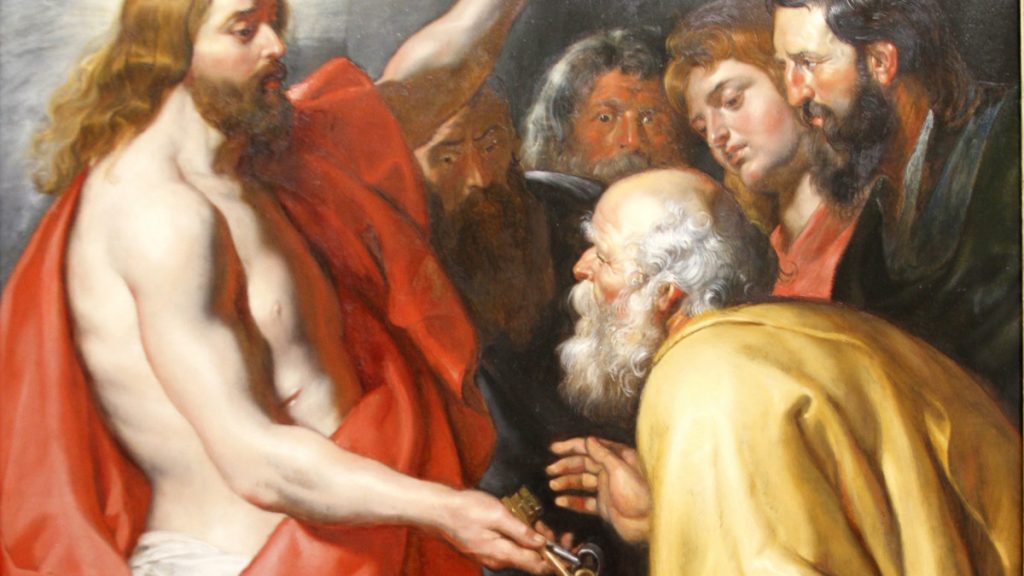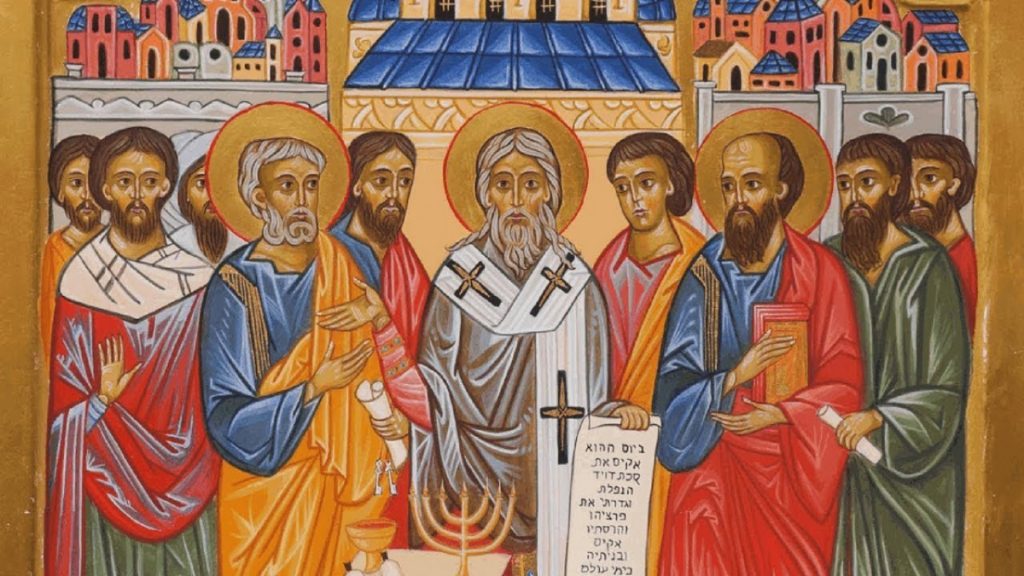(Updated July 15, 2025)
This Author Quote Archive collects pertinent quotes from the Church Father, St. Basil.
Next to each quote are the Topic Quote Archives in which they are included.
This Quote Archive is being continuously updated as research continues. Quotes marked with “***” have not yet been organized into their respective Topic Quote Archives.
Treatises
St. Basil, An Ascetical Discourse and Exhortation on the Renunciation of the World and Spiritual Perfection (373)1
If you are youthful in body or mind, fly from intimate association with comrades of your own age and run away from them as from fire. The Enemy has, indeed, set many aflame through such means and consigned them to the eternal fire, casting them down into that loathsome pit of the five cities [Gen. 10:19; Deut. 29:23] on the pretext of spiritual love. Even those who have come safely through every wind and tempest on the sea and are safe in port he has sent down into the deep, together with the ship and crew. At meals take a seat far away from your young brother; in lying down to rest, let not your garments be neighbor to his; rather, have an elderly brother lying between you. When a young brother converses with you or is opposite you in choir, make your response with your head bowed lest, perchance, by gazing fixedly into his face, the seed of desire be implanted in you by the wicked Sower and you reap sheaves 23 | 24 of corruption and ruin. At home or in a place where there is no witness of your actions, be not found in his company under the pretext of meditation on the Divine Words or for any other excuse, even the most urgent need; nothing is of greater urgency than the soul for whom Christ died. Do not believe the crafty argument which suggests to you that this is quite harmless thing to do, but be fully convinced, by the oft-repeated experience of those who have fallen and have clearly demonstrated it to be so, that it is of itself an offensive act.
St. Basil, The Holy Spirit (c. 374)
- Apostolic Tradition | Ch. 27, §66; Ch. 29, §71
- Purgatory | Ch. 29, §73
- The Sacrament of Baptism | Ch. 15, §35
(Ch. 7, §16) ***
It is also quite untrue to allege that the phrase “with whom” is unfamiliar in the usage of the devout. All those whose soundness of character leads them to hold the dignity of antiquity to be more honorable than mere new-fangled novelty, and who have preserved the tradition of their fathers unadulterated [Gal. 1:14], alike in town and in country, have employed this phrase. It is, on the contrary, they who are surfeited with the familiar and the customary, and arrogantly assail the old as stale, who welcome innovation, just as in dress your lovers of display always prefer some utter novelty to what is generally worn. So you may even still see that the language of country folk preserves the ancient fashion, while of these, our cunning experts in logomachy, the language bears the brand of the new philosophy.
In three immersions, then, and with three invocations, the great mystery of baptism is performed, to the end that the type of death may be fully figured, and that by the tradition of the divine knowledge the baptized may have their souls enlightened. It follows that if there is any grace in the water, it is not of the nature of the water, but of the presence of the Spirit.
(§66) Of the beliefs and practices whether generally accepted or publicly enjoined which are preserved in the Church some we possess derived from written teaching; others we have received delivered to us in a mystery by the tradition of the apostles; and both of these in relation to true religion have the same force. And these no one will gainsay—no one, at all events, who is even moderately versed in the institutions of the Church. For were we to attempt to reject such customs as have no written authority, on the ground that the importance they possess is small, we should unintentionally injure the Gospel in its very vitals; or, rather, should make our public definition a mere phrase and nothing more. *** For instance, to take the first and most general example, who is thence who has taught us in writing to sign with the sign of the cross those who have trusted in the name of our Lord Jesus Christ? What writing has taught us to turn to the East at the prayer? Which of the saints has left us in writing the words of the invocation at the displaying of the bread of the Eucharist and the cup of blessing? For we are not, as is well known, content with what the apostle or the Gospel has recorded, but both in preface and conclusion we add other words as being of great importance to the validity of the ministry, and these we derive from unwritten teaching.
Moreover we bless the water of baptism and the oil of the chrism, and besides this the catechumen who is being baptized. On what written authority do we do this? Is not our authority silent and mystical tradition? Nay, by what written word is the anointing of oil itself taught? And whence comes the custom of baptizing thrice? And as to the other customs of baptism from what Scripture do we derive the renunciation of Satan and his angels? Does not this come from that unpublished and secret teaching which our fathers guarded in a silence out of the reach of curious meddling and inquisitive investigation? Well had they learnt the lesson that the awful dignity of the mysteries is best preserved by silence. What the uninitiated are not even allowed to look at was hardly likely to be publicly paraded about in written documents.
What was the meaning of the mighty Moses in not making all the parts of the tabernacle open to everyone? The profane he stationed without the sacred barriers; the first courts he conceded to the purer; the Levites alone he judged worthy of being servants of the Deity; sacrifices and burnt offerings and the rest of the priestly functions he allotted to the priests; one chosen out of all he admitted to the shrine, and even this one not always but on only one day in the year, and of this one day a time was fixed for his entry so that he might gaze on the Holy of Holies amazed at the strangeness and novelty of the sight. Moses was wise enough to know that contempt stretches to the trite and to the obvious, while a keen interest is naturally associated with the unusual and the unfamiliar.
In the same manner the Apostles and Fathers who laid down laws for the Church from the beginning thus guarded the awful dignity of the mysteries in secrecy and silence, for what is bruited abroad random among the common folk is no mystery at all. This is the reason for our tradition of unwritten precepts and practices, that the knowledge of our dogmas may not become neglected and contemned by the multitude through familiarity.
“Dogma” and “Kerugma” are two distinct things; the former is observed in silence; the latter is proclaimed to all the world. One form of this silence is the obscurity employed in Scripture, which makes the meaning of “dogmas” difficult to be understood for the very advantage of the reader.
Thus we all look to the East at our prayers, but few of us know that we are seeking our own old country [Heb. 11:14], Paradise, which God planted in Eden in the East [Gen. 2:8]. We pray standing, on the first day of the week, but we do not all know the reason. On the day of the resurrection (or “standing again” Grekk ἀνάστασις) we remind ourselves of the grace given to us by standing at prayer, not only because we rose with Christ, and are bound to “seek those things which are above” (Col. 3:1), but because the day seems to us to be in some sense an image of the age which we expect, wherefore, though it is the beginning of days, it is not called by Moses “first,” but “one” (Gen. 1:5). For he says “There was evening, and there was morning, one day,” as though the same day often recurred. Now “one” and “eighth” are the same, in itself distinctly indicating that really “one” and “eighth” of which the Psalmist makes mention in certain titles of the Psalms, the state which follows after this present time, the day which knows no waning or eventide, and no successor, that age which ends not or grows old. Of necessity, then, the church teaches her own foster children to offer their prayers on that day standing, to the end that through continual reminder of the endless life we may not neglect to make provision for our removal thither. Moreover, all Pentecost is a reminder of the resurrection expected in the age to come. For that one and first day, if seven times multiplied by seven, completes the seven weeks of the holy Pentecost; for, beginning at the first, Pentecost ends with the same, making fifty revolutions through the like intervening days. And so it is a likeness of eternity, beginning as it does and ending, as in a circling course, at the same point. On this day the rules of the church have educated us to prefer the upright attitude of prayer, for by their plain reminder they, as it were, make our mind to dwell no longer in the present but in the future. Moreover, every time we fall upon our knees and rise from off them we shew by the very deed that by our sin we fell down to earth, and by the loving kindness of our Creator were called back to heaven.
(§67) Time will fail me if I attempt to recount the unwritten mysteries of the Church. Of the rest I say nothing; but of the very confession of our faith in Father, Son, and Holy Ghost, what is the written source? If it be granted that, as we are baptized, so also under the obligation to believe, we make our confession in like terms as our baptism, in accordance with the tradition of our baptism and in conformity with the principles of true religion, let our opponents grant us too the right to be as consistent in our ascription of glory as in our confession of faith. If they deprecate our doxology on the ground that it lacks written authority, let them give us the written evidence for the confession of our faith and the other matters which we have enumerated. While the unwritten traditions are so many, and their bearing on “the mystery of godliness” (1 Tim. 3:16) is so important, can they refuse to allow us a single word which has come down to us from the Fathers—which we found, derived from untutored custom, abiding in unperverted churches—a word for which the arguments are strong, and which contributes in no small degree to the completeness of the force of the mystery?
(§71) In answer to the objection that the doxology in the form with the Spirit has no written authority, we maintain that if there is no other instance of that which is unwritten, then this must not be received. But if the greater number of our mysteries are admitted into our constitution without written authority, then, in company with the many others, let us receive this one. For I hold it apostolic to abide also by the unwritten traditions. “I praise you,” it is said, “that you remember me in all things, and keep the ordinances as I delivered them to you” (1 Cor. 11:2); and “Hold fast the traditions which you have been taught whether by word, or our Epistle” (2 Thess. 2:15). One of these traditions is the practice which is now before us, which they who ordained from the beginning, rooted firmly in the churches, delivering it to their successors, and its use through long custom advances pace by pace with time. If, as in a Court of Law, we were at a loss for documentary evidence, but were able to bring before you a large number of witnesses, would you not give your vote for our acquittal? I think so; for at the mouth of two or three witnesses shall the matter be established [Deut. 19:15]. And if we could prove clearly to you that a long period of time was in our favor, should we not have seemed to you to urge with reason that this suit ought not to be brought into court against us? For ancient dogmas inspire a certain sense of awe, venerable as they are with a hoary antiquity. I will therefore give you a list of the supporters of the word (and the time too must be taken into account in relation to what passes unquestioned). For it did not originate with us. How could it? We, in comparison with the time during which this word has been in vogue, are, to use the words of Job, but of yesterday [Job 8:9]. I myself, if I must speak of what concerns me individually, cherish this phrase as a legacy left me by my fathers. It was delivered to me by one who spent a long life in the service of God, and by him I was both baptized, and admitted to the ministry of the church. While examining, so far as I could, if any of the blessed men of old used the words to which objection is now made, I found many worthy of credit both on account of their early date, and also a characteristic in which they are unlike the men of today—because of the exactness of their knowledge…
(§73) …And if any one knows the Hymn of Athenogenes, which, as he was hurrying on to his perfecting by fire, he left as a kind of farewell gift to his friends, he knows the mind of the martyrs as to the Spirit. On this head I shall say no more.
St. Basil, Rules Briefly Treated (c. 375)
Sins are to be confessed to those who have been entrusted with 74 | 75 the dispensation of the mysteries of God. For so those who were repentant are found to have confessed their sins to John the Baptist; and in the Acts, to the Apostles, by whom they had all been baptized.
St. Basil, On the Judgment of God3 ***
After a long time spent in this state of indecision and while I was still busily searching for the cause I have mentioned, there came to my mind the Book of Judges which tells how each man did what was right in his own eyes and gives the reason for this in the words: “In those days there was no king in Israel” (Judg. 21:24). With these words in mind, then, I applied also to the present circumstances that explanation which, incredible and frightening as it may be, is quite truly pertinent when it is understood; for never before has there arisen such discord and quarrelling as now among the members of the Church in consequence of their turning away from the one, great, and true God, only King of the universe. Each man, indeed, abandons the teachings of our Lord Jesus Christ and arrogates to himself authority in dealing with certain questions, making his own private rules, and preferring to exercise leadership in opposition to the Lord to being led by the Lord. Reflecting upon this and aghast at the magnitude of the impiety, I pursued my investigation further and became convinced that the aforesaid cause was no less the true source also of secular difficulties. I noticed that as long as the common obedience of the others to some one leader was maintained, all was discipline and harmony in the whole group; but that division and discord and a rivalry of leaders besides proceeded from a lack of leadership. Moreover, I once had observed how even a swarm of bees, in accordance with a law of nature, lives under military discipline and obeys its own king 38 | 39 with orderly precision. Many such instances have I witnessed and many others I have heard of, and persons who make profession of such matters know many more still, so that they can vouch for the truth of what I have said. Now, if good order with its attendant harmony is characteristic of those who look to one source of authority, and are subject to one king, then universal disorder and disharmony are a sign that leadership is wanting. By the same token, if we discover in our midst such lack of accord as I have mentioned, both with regard to one another and with respect to the Lord’s commands, it would be an indictment either of our rejection of the true king, according to the Scriptural saying: “only that he who now holdeth, do hold, until he be taken out of the way” (2 Thess. 2:7), or of denial of Him according to the Psalmist: “The fool hath said in his heart: There is no God” (Ps. 13:1). And as a kind of token or proof of this, there follow the words: “They are corrupt and are become abominable in their ways.”
Sermons
St. Basil, Homily on the Holy Birth of Christ (c. 370-78)
(§5)4 ***
“And when Joseph woke from sleep, he took her as his wife” (Matt. 1:24). He undertook his marriage with the disposition that is incumbent upon spouses, having affection for his wife and caring for her in every way. But he abstained from marital relations. For it says: “He did not know her until she had given birth to her firstborn son” (Matt. 1:25). Now this verse has given rise to the conjecture that, after rendering pure service in accomplishing the birth of the Lord through the Holy Spirit, Mary did not renounce the customary marital relations. But in our opinion, even if none of this harms the 360 | 361 account of piety–for virginity was necessary for service in the economy, but inquiring into what happened next out of curiosity should be avoided by reason of its mystery–nonetheless, since lovers of Christ do not accept the opinion that the Theotokos ever ceased being a virgin, we think the following testimonies suffice. Let us return to: “He did not know her until she had given birth to her son.” In many instances the word “until” seems to suggest a kind of temporal boundary, but in reality it indicates indefiniteness. What did the Lord mean when he said: “And behold, I am with you all days, until the close of the age” (Matt. 28:20)? Indeed, not that the Lord was not going to be with the saints after this age! Rather, it means that the promise of the present age will not be rescinded in the age to come. So we say that in this case too the word “until” should be taken in the same way. Now when “firstborn” is said, by no means is he the firstborn in comparison to siblings who came after him. Rather, he is called the firstborn because he was the first one to open the womb of his mother. It is also clear from the story about Zechariah that Mary was always a virgin. For there is an account, and it has been handed down to us from the tradition, that Zechariah entrusted Mary to the place for the virgins after conceiving the Lord. Then he slaughtered by the Jews between the temple and the altar [Matt. 23:35]. Charges had been brought against him by the people, on the grounds that by his actions he established that incredible and famous sign: a virgin gave birth and her virginity was not destroyed.
St. Basil, Eulogies on the Martyrs and Sermons on Moral and Practical Subjects (c. 374)
- The Sacrament of Baptism | 13:5
(13:5)5
For prisoners, baptism is ransom, forgiveness of debts, the death of sin, regeneration of the soul, a resplendent garment, an unbreakable seal, a chariot to heaven, a royal protector, a gift of adoption.
St. Basil, Exhortation to Baptism (379)6
Baptism is the ransom of captives, the remission of debts, the death of sin, the regeneration of the soul, the robe of light, the seal which cannot be broken, the chariot to heaven, the means to attain the kingdom, the gift of adoption. Do you think that pleasure is preferable to these and such like blessings?
St. Basil, Concerning Baptism
- The Sacrament of Baptism | Ch. 2
(Ch. 2)7
The manner of our being born anew of water, Paul states authoritatively when he says, speaking in Christ: [quotes Rom. 6:3-11] In all this, the nature of our regeneration is viewed under the form of an analogy. But it would be impossible to be born anew unless the grace of God had first been vouchsafed to us, as the Apostle himself shows, not only in the words just quoted, but also in subsequent passages concerning Baptism, beginning with the words: “But God commandeth his charity towards us; because when as yet we were sinners, Christ died for us; much more, therefore, being now justified by his blood, shall we be saved from wrath through him. For if, when we were enemies, we 359 | 360 were reconciled to God by the death of his Son, much more, being reconciled, shall we be saved by his life” (Rom. 5:8-10).
And there are many passages of this sort which set forth with clarity and splendor the great, ineffable benevolence of God in freely pardoning our sins and granting us the means and the power of performing righteous acts for the glory of God and His Christ in the hope of gaining eternal life through Jesus Christ our Lord.
Letters
St. Basil, Letter 125: Transcript of the Faith Dictated by St. Basil, and Subscribed to by Eustathius, Bishop of Sebasteia (373)
Both men whose minds have been preoccupied by a heterodox creed and now wish to change over to the congregation of the orthodox, and also those who are now for the first time desirous of being instructed in the doctrine of truth, must be taught the creed drawn up by the blessed fathers in the Council which met at Nicaea. The same training would also be exceedingly useful in the case of all who are under suspicion of being in a state of hostility to sound doctrine, and who by ingenious and plausible excuses keep the depravity of their sentiments out of view. For these too this creed is all that is needed. They will either get cured of their concealed unsoundness, or, by continuing to keep it concealed, will themselves bear the load of the sentence due to their dishonesty, and will provide us with an easy defense in the day of judgment, when the Lord will lift the cover from the hidden things of darkness, and “make manifest the counsels of the hearts” (1 Cor. 1:5). It is therefore desirable to receive them with the confession not only that they believe in the words put forth by our fathers at Nicaea, but also according to the sound meaning expressed by those words. For there are men who even in this creed pervert the word of truth, and wrest the meaning of the words in it to suit their own notions. So Marcellus, when expressing impious sentiments concerning the hypostasis of our Lord Jesus Christ, and describing Him as being Logos and nothing more, had the hardihood to profess to find a pretext for his principles in that creed by affixing an improper sense upon the Homoousion. Some, moreover, of the impious following of the Libyan Sabellius, who understand hypostasis and substance to be identical, derive ground for the establishment of their blasphemy from the same source, because of its having been written in the creed “if anyone says that the Son is of a different substance or hypostasis, the Catholic and Apostolic Church anathematizes him.” But they did not there state hypostasis and substance to be identical. Had the words expressed one and the same meaning, what need of both? It is on the contrary clear that while by some it was denied that the Son was of the same substance with the Father, and some asserted that He was not of the substance and was of some other hypostasis, they thus condemned both opinions as outside that held by the Church.
St. Basil, Letter 140: To the Church at Antioch (373)8
We believe these truths [in the Nicene Creed]. But, since the doctrine concerning the Holy Spirit was undefined, as at that time the Pneumatomachi [heretics of a sect founded by Macedonius] had not yet appeared, they [the Fathers of Nicaea] were silent as to the necessity of anathematizing those who say that the Holy Spirit is of a created and servile nature. For, absolutely nothing of the Divine and Blessed Trinity is created.
St. Basil, Letter 159: To Eupaterius and His Daughter (373)9
Since the question which has at present arisen among those who are always attempting to make innovations [heretics], but which had been passed over in silence by the men of earlier times [i.e. the Fathers of Nicaea] because the doctrine was not contradicted, has been left unexplained (I mean, of course, that concerning the Holy Spirit), we are adding the explanation of it in conformity with the meaning of the Scriptures…
St. Basil, Letter 164: To Ascholius, Bishop of Thessalonica (374)10
In fact, we ascribe to ourselves and our sins the blame for such extensive spreading of the power of the heretics. For, almost no part of the world has escaped the conflagration of heresy…But, what are our conditions? Charity has grown cold. The doctrine of the Fathers is being destroyed; shipwreck in the faith is frequent; the mouths of the pious are silent; people, driven from the houses of prayer, out in the open fields lift up their hands to the Lord in heaven. Truly, the afflictions are heavy, but nowhere is there martyrdom, because those who inflict the evils upon us have the same name as we do. For these reasons do you yourself beseech the Lord and join with you in prayer in behalf of the churches all the noble athletes of Christ, in order that, if some time still remains for the existence of the world, and all things are not being driven 325 | 326 together in the opposite direction [i.e. destruction], God, being reconciled to His churches, may lead them back again to the ancient peace.
St. Basil, Letter 188: To Amphilochius, Concerning the Canons (374)
- Abortion | §§2, 8
(§§2, 8)11
(§2) She who has deliberately destroyed a fetus has to pay the penalty of murder. And there is no exact inquiry among us as to whether the fetus was formed or unformed. For, here it is not only the child to be born that is vindicated, but also the woman herself who made an attempt against 12 | 13 her own life, because usually the women die in such attempts. Furthermore, added to this is the destruction of the embryo, another murder, at least according to the intention of those who dare these things. Nevertheless, we should not prolong their penance until death, but should accept a term of ten years, and we should determine the treatment not by time, but by the manner of repentance… 13 | 19
(§8) …Moreover, those [women], too, who give drugs causing abortion are murderers themselves, as well as those receiving the poison which kills the fetus. These, then, are the explanations for such a matter.
St. Basil, Letter 199: To Amphilochius, Concerning the Canons (375)
- The Sacrament of Marriage, Divorce, and Contraception | §37
- Mortal Sin: Christians Can Lose Their Salvation | §31
(§31) Clerics who are guilty of the sin unto death [1 John 5:16] are degraded from their order, but not excluded from the communion of the laity…
(§37) The man who marries after abducting another man’s wife will incur the charge of adultery for the first case; but for the second will go free.
St. Basil, Letter 207: To the Clergy of Neocaesarea (summer 375)
(§1) ***
Do not, my brethren, gratify the vanity of those who are filling your minds with pernicious opinions. Do not consent to look lightly on, when, to your knowledge, God’s people are being subverted by impious teaching. None but Sabellius the Libyan and Marcellus the Galatian [heretics] have dared to teach and write what the leaders of your people are attempting to bring forward among you as their own private discovery. They are making a great talk about it, but they are perfectly powerless to give their sophisms and fallacies even any color of truth. In their harangues against me they shrink from no wickedness, and persistently refuse to meet me. Why? Is it not because they are afraid of being convicted for their own wicked opinions? Yes; and in their attacks upon me they have become so lost to all sense of shame as to invent certain dreams to my discredit while they falsely accuse my teaching of being pernicious. Let them take upon their own heads all the visions of the autumn months; they can fix no blasphemy on me, for in every Church there are many to testify to the truth.
St. Basil, Letter 214: To Count Terentius (375)
(§2) ***
But a further rumor has reached me that you are in Antioch, and are transacting the business in hand with the chief authorities [Rome]. And, besides this, I have heard that the brethren who are of the party of Paulinus are entering on some discussion with your excellency on the subject of union with us; and by “us” I mean those who are supporters of the blessed man of God, Meletius. I hear, moreover, that the Paulinians are carrying about a letter of the Westerns, assigning to them the episcopate of the Church in Antioch, but speaking under a false impression of Meletius, the admirable bishop of the true Church of God. I am not astonished at this. They are totally ignorant of what is going on here; the others, though they might be supposed to know, give an account to them in which party is put before truth; and it is only what one might expect that they should either be ignorant of the truth, or should even endeavor to conceal the reasons which led the blessed Bishop Athanasius to write to Paulinus. But your excellency has on the spot those who are able to tell you accurately what passed between the bishops in the reign of Jovian [winter 363-early 364], and from them I beseech you to get information.2814
I accuse no one; I pray that I may have love to all, and “especially unto them who are of the household of faith” (Gal. 6:10); and therefore I congratulate those who have received the letter from Rome [see St. Pope Damasus I, Letter 1: Per filium meum Vitaliem (375)]. And, although it is a grand testimony in their favor, I only hope it is true and confirmed by facts. But I shall never be able to persuade myself on these grounds to ignore Meletius, or to forget the Church which is under him, or to treat as small, and of little importance to the true religion, the questions which originated the division. I shall never consent to give in, merely because somebody is very much elated at receiving a letter from men. Even if it had come down from heaven itself, but he does not agree with the sound doctrine of the faith, I cannot look upon him as in communion with the saints.
St. Basil, Letter 226: To Ascetics Under Him (375)
(§2) ***
Ask them, then, if Basilides, who gave communion to Ecdicius, is now orthodox, why when returning from Dardania, did they overthrow his altars in the territory of Gangra, and set up their own tables?
St. Basil, Letter 240: To the Presbyters of Nicopolis (376)
(§3) ***
Only do not be deceived by their lies when they claim to be of the right faith. They are not Christians, but traffickers in Christ, always preferring their profit in this life to living in accordance with the truth. When they thought that they should get this empty dignity, they joined the enemies of Christ: now that they have seen the indignation of the people, they are once more for pretending orthodoxy. I do not recognize as bishop—I would not count among Christ’s clergy—a man who has been promoted to a chief post by polluted hands, to the destruction of the faith. This is my decision. If you have any part with me, you will doubtless think as I do. If you take counsel on your own responsibility, every man is master of his own mind, and I am innocent of this blood [Matt. 4:24]. I have written thus, not because I distrust you, but that by declaring my own mind I may strengthen some men’s hesitation, and prevent any one from being prematurely received into communion, or after receiving the laying on of hands of our enemies, when peace is made, later on, trying to force me to enroll them in the ranks of the sacred ministry. Through you I salute the clergy of the city and diocese, and all the laity who fear the Lord.
St. Basil, Letter 243: To the Bishops of Italy and Gaul Concerning the Condition and Confusion of the Churches (376)
(§2) ***
Persecution has come upon us, right honorable brethren, and persecution in the severest form. Shepherds are persecuted that their flocks may be scattered. And the worst of all is that those who are being treated ill cannot accept their sufferings in proof of their testimony, nor can the people reverence the athletes as in the army of martyrs, because the name of Christians is applied to the persecutors. The one charge which is now sure to secure severe punishment is the careful keeping of the traditions of the Fathers. For this the pious are exiled from their homes, and are sent away to dwell in distant regions. No reverence is shown by the judges of iniquity to the hoary head, to practical piety, to the life lived from boyhood to old age according to the Gospel. No malefactor is doomed without proof, but bishops have been convicted on calumny alone, and are consigned to penalties on charges wholly unsupported by evidence. Some have not even known who has accused them, nor been brought before any tribunal, nor even been falsely accused at all. They have been apprehended with violence late at night, have been exiled to distant places, and, through the hardships of these remote wastes, have been given over to death. The rest is notorious, though I make no mention of it—the flight of priests; the flight of deacons; the foraying of all the clergy. Either the image must be worshiped, or we are delivered to the wicked flame of whips [Dan. 3:10]. The laity groan; tears are falling without ceasing in public and in private; all are mutually lamenting their woes. No one’s heart is so hard as to lose a father, and bear the bereavement meekly. There is a sound of them that mourn in the city—a sound in the fields, in the roads, in the deserts. But one voice is heard from all that utter sad and piteous words. Joy and spiritual gladness are taken away. Our feasts are turned into mourning [Amos 8:10]. Our houses of prayer are shut. The altars of the spiritual service are lying idle. Christians no longer assemble together; teachers no longer preside. The doctrines of salvation are no longer taught. We have no more solemn assemblies, no more evening hymns, no more of that blessed joy of souls which arises in the souls of all that believe in the Lord at communions, and the imparting of spiritual boons. We may well say, “Neither is there at this time prince, or prophet, or reader, or offering, or incense, or place to sacrifice before thee, and to find mercy” (Dan. 3:14, LXX).
St. Basil, Letter 261: To Sozopolitans (377)
(§3) ***
These, brethren, are the mysteries of the Church; these are the traditions of the Fathers. Every man who fears the Lord, and is awaiting God’s judgment, I charge not to be carried away by various doctrines. If any one teaches a different doctrine, and refuses to accede to the sound words of the faith, rejecting the oracles of the Spirit, and making his own teaching of more authority than the lessons of the Gospels, of such an one beware. May the Lord grant that one day we may meet, so that all that my argument has let slip I may supply when we stand face to face! I have written little when there was much to say, for I did not like to go beyond my letter’s bounds. At the same time I do not doubt that to all that fear the Lord a brief reminder is enough.
St. Basil, Letter 279: To Amphilochius, On the Canons (375)
He who is guilty of unseemliness with males will be under discipline for the same time as adulterers.
St. Basil, First Canonical Letter (after 270)
Let her that procures abortion undergo ten years’ penance, whether the embryo were perfectly formed, or not.
Footnotes
- St. Basil, M. Monica Wagner, CSC, trans., The Fathers of the Church, Vol. 9: Saint Basil, Ascetical Works (Washington, DC: The Catholic University of America Press, 1950), 23-24. ↩︎
- E.F. Morison, St. Basil and His Rule: A Study in Early Monasticism (London: Oxford University Press, 1912), 74-75. ↩︎
- St. Basil, M. Monica Wagner, C.S.C., trans., The Fathers of the Church, Vol. 9: Saint Basil, Ascetical Works (Washington, DC: The Catholic University of America Press, 1999), 38-39. ↩︎
- Mark DelCogliano, ed., The Cambridge Edition of Early Christian Writings, Vol. 3: Christ: Through the Nestorian Controversy (Cambridge: Cambridge University Press, 2022), 360-61. ↩︎
- Jimmy Akins, The Fathers Know Best: Your Essential Guide to the Teachings of the Early Church (San Diego: Catholic Answers Press, 2010), 260. ↩︎
- St. Basil the Great, Exhortation to Baptism; Francis Patrick Kenrick, Bishop of Philadelphia, A Treatise on Baptism, with an Exhortation to Receive it, Translated from the Works of St. Basil the Great (Philadelphia: M Fithian, 1843), 233. ↩︎
- St. Basil, M. Monica Wagner, C.S.C., trans., The Fathers of the Church, Vol. 9: Saint Basil, Ascetical Works (Washington, DC: The Catholic University of America Press, 1999), 359-60. ↩︎
- St. Basil, Sister Agnes Clare Way, C.D.P., trans., The Fathers of the Church, Vol. 13: Letters, Vol. 1 (1-185) (Washington, DC: The Catholic University of America Press, 1951), 289. ↩︎
- St. Basil, Sister Agnes Clare Way, C.D.P., trans., The Fathers of the Church, Vol. 13: Letters, Vol. 1 (1-185) (Washington, DC: The Catholic University of America Press, 1951), 313. ↩︎
- St. Basil, Sister Agnes Clare Way, C.D.P., trans., The Fathers of the Church, Vol. 13: Saint Basil, Letters, Vol. 1 (1-185) (Washington, DC: The Catholic University of America Press, 1951), 325-26. ↩︎
- St. Basil, Agnes Clare Way, CDP, trans., The Fathers of the Church, Vol. 28: Saint Basil, Letters, Vol. 2 (186-368) (Washington, DC: The Catholic University of America Press, 1955), 12-13, 19. ↩︎
